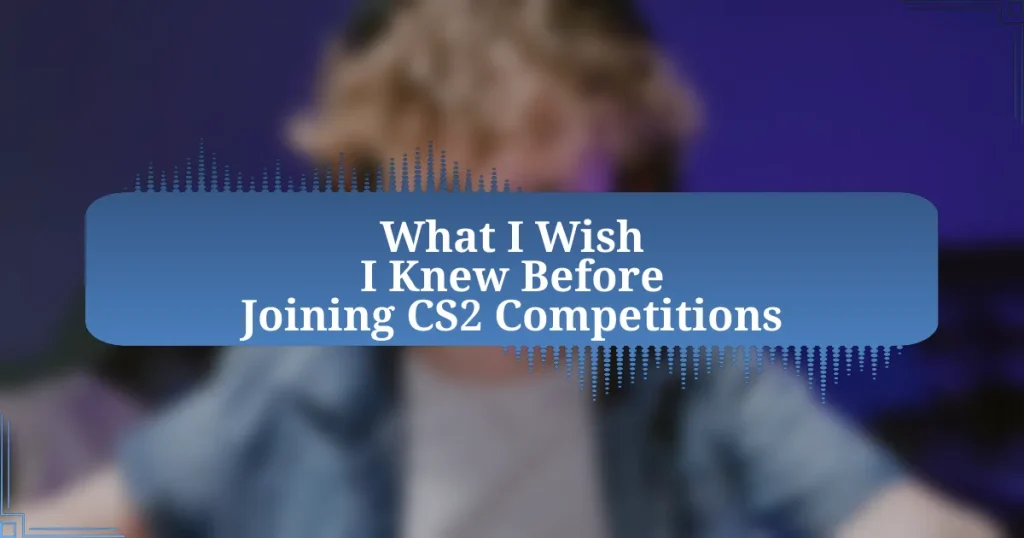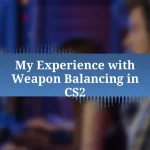Key takeaways:
- CS2 competitions foster personal growth through skill development, teamwork, and the formation of lasting friendships within a passionate community.
- Mastering game mechanics, such as movement and map knowledge, along with effective utility usage, is crucial for success in competitive play.
- Essential skills include clear communication, adaptability during matches, and mental resilience to handle the pressures of competition.
- Preparation involves practicing as a team, fine-tuning settings, and developing mental strategies to manage nerves effectively.
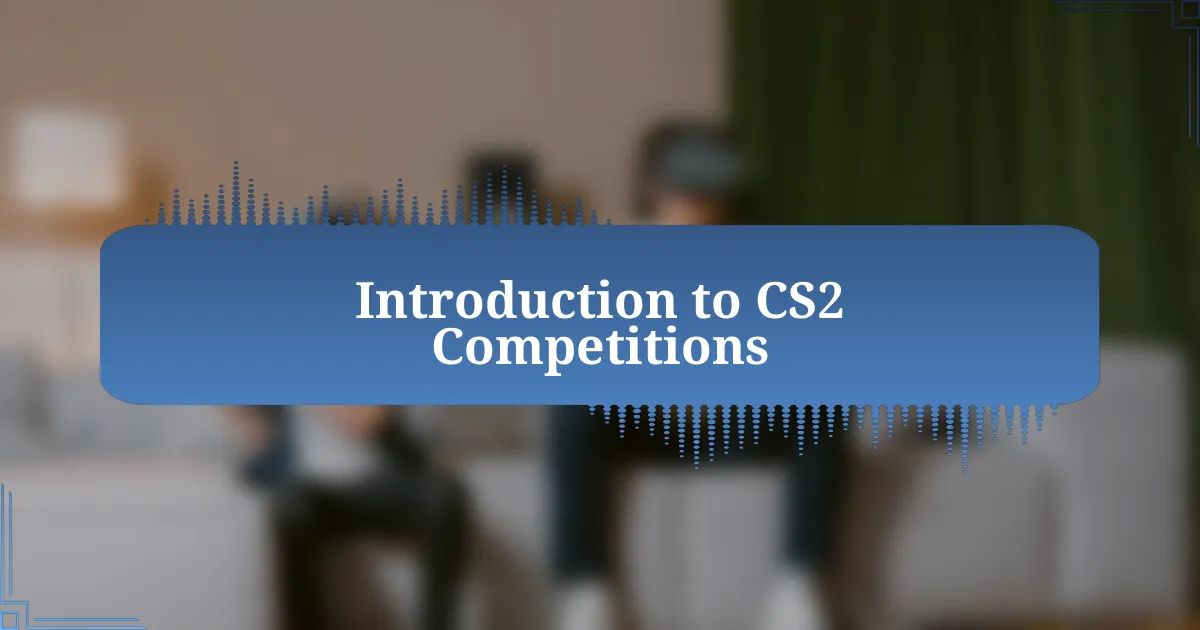
Introduction to CS2 Competitions
CS2 competitions offer a thrilling opportunity for players to showcase their skills and compete at a higher level. They can be an adrenaline-fueled experience or an outright nerve-wracking endeavor, depending on your preparation and mindset. I remember my first competition; the excitement was palpable, but so was the pressure. What if I choked? That fear, combined with the anticipation, really set the stage for a transformative experience.
Engaging in these competitions introduces you to a tightly-knit community of passionate gamers who share your interests. The conversations often revolve around strategies, maps, and even the latest patches in the game. I vividly recall bonding with fellow competitors over shared struggles during practice sessions, which turned into lasting friendships. This aspect of competition enriches your gaming experience, making it less about winning and more about connection.
There’s a steep learning curve in CS2 competitions that can be daunting yet exhilarating. As I dove deeper into strategies and teamwork dynamics, I often found myself questioning my own gameplay habits. Was I making the right decisions under pressure? I learned that not only did each match offer a chance to improve, but every loss primed me for future success. So, are you ready to take the plunge into the competitive scene?
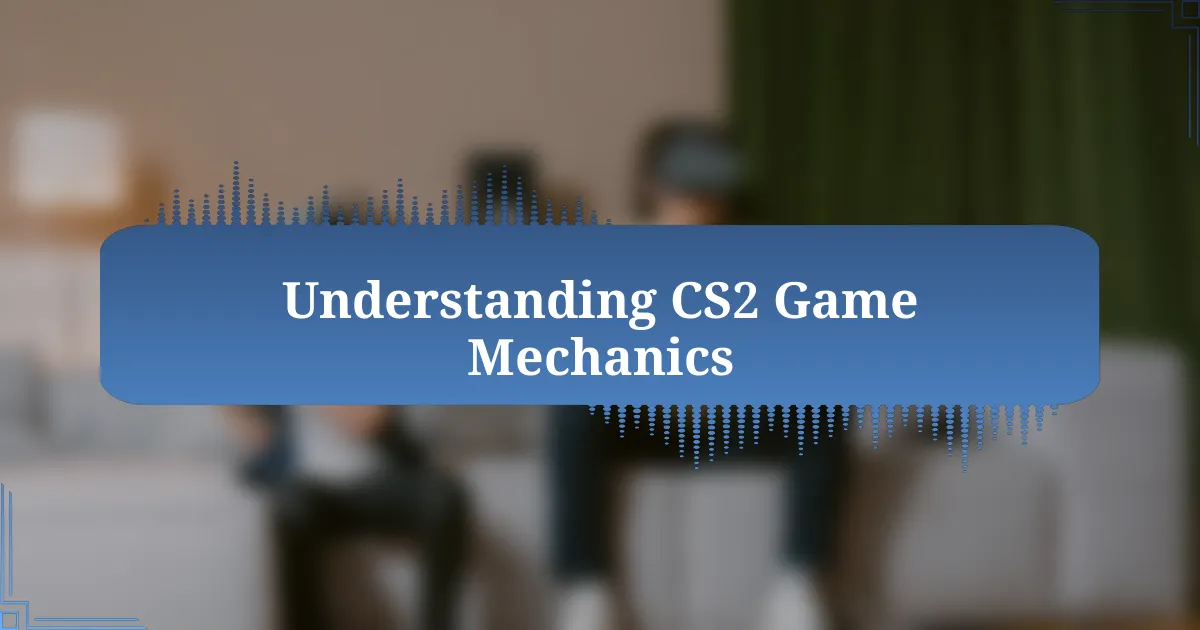
Understanding CS2 Game Mechanics
Understanding the mechanics of CS2 is crucial for any competitor looking to excel. I learned the hard way that mastering movement can be just as important as aiming. When I first started, I often neglected the nuances of strafing and counter-strafing, thinking solid aim alone would carry me through. It wasn’t until I got caught in a firefight, unable to dodge incoming shots, that I realized how vital these mechanics are in gaining an edge over opponents.
Another key aspect is map knowledge. Each map has unique angles, hiding spots, and chokepoints, which can drastically influence strategy. I remember the first time I played on Mirage; I spent hours memorizing common hiding places and rotation paths. Doing so changed how I approached each match, giving me a sense of confidence as I anticipated my opponents’ moves. Can you imagine walking into a game knowing the map like the back of your hand? It’s a game changer.
Don’t underestimate the importance of utility usage either. Effective use of grenades can turn the tide of a match. In my early days, I would often hoard my grenades, unsure of when to use them. But after one match where a well-placed smoke made all the difference, I understood their value. Knowing when to deploy a flashbang or a Molotov can not only secure a kill but also disrupt enemy plans. It’s about creating opportunities—something I wish I had grasped sooner.
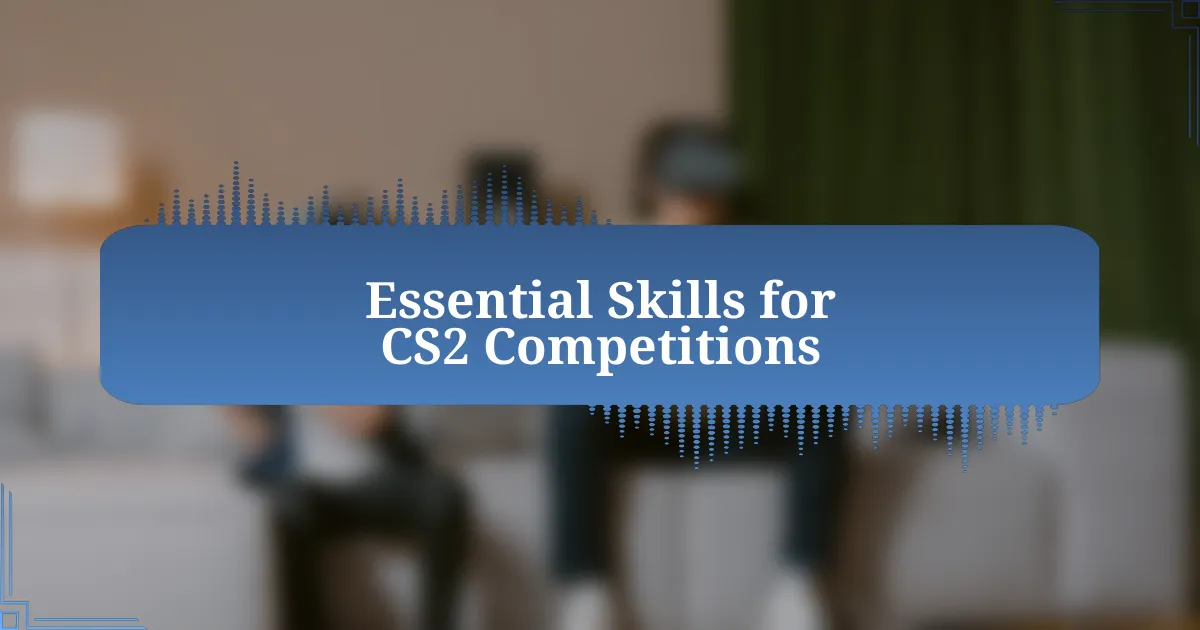
Essential Skills for CS2 Competitions
Key skills in CS2 competitions go beyond just mechanical prowess; they include teamwork and communication. Reflecting on my first experience in a competitive team setting, I vividly recall the chaos of trying to coordinate strategies without a solid plan. It was a humbling reminder that knowing how to relay information effectively during a match can be the difference between winning and losing. Have you ever wondered why some teams mesh so well? The answer often lies in their ability to communicate clearly and adaptively under pressure.
Another essential skill is adaptability. I found that the ability to switch up tactics based on the flow of the game significantly improved my performance. There was one match where we faced a line-up that consistently countered our plays. It was frustrating at first, but when we decided to change our approach—switching bomb sites and altering our aggression—it not only threw them off guard but also reignited our team’s motivation. Have you ever experienced that “aha” moment when a slight change made everything click? It’s a testament to how flexibility can enhance your game.
Finally, mental resilience is crucial in a competition setting. I remember one match where everything seemed to go wrong; I kept missing crucial shots and my confidence plummeted. Instead of wallowing in disappointment, I focused on the next round, resetting my mindset. Embracing the inevitability of mistakes and learning from them can be a powerful tool in competitive play. Don’t you think that how we handle setbacks can define our overall experience in CS2?
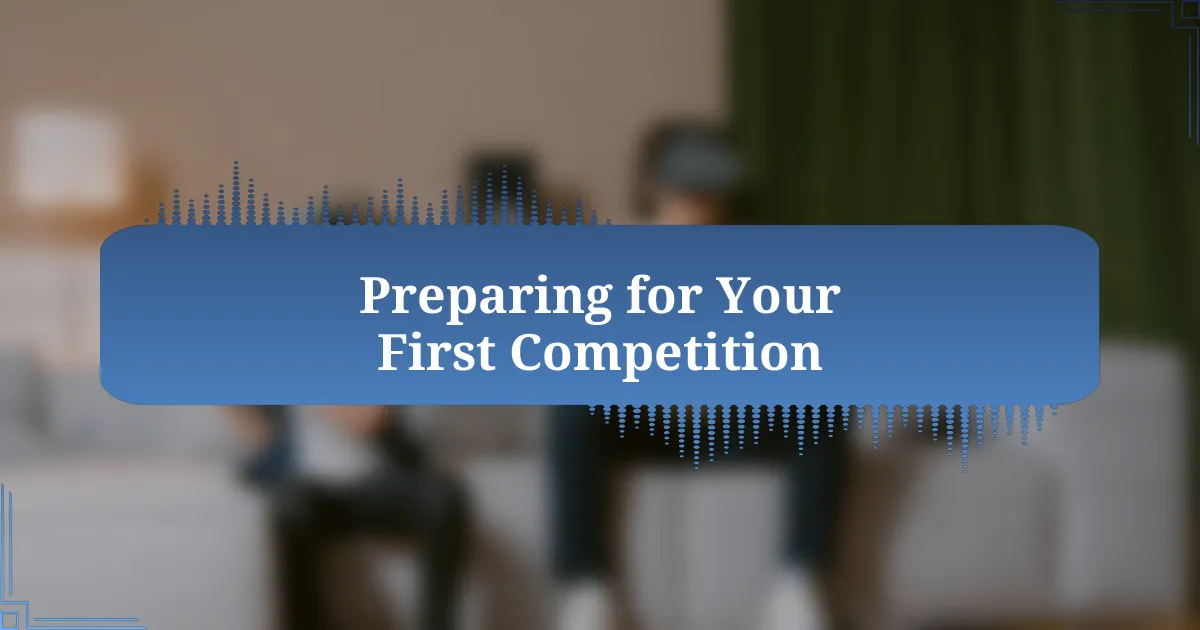
Preparing for Your First Competition
When preparing for your first CS2 competition, gather as much practice as possible with your team before the event. I recall my first few scrimmages, where every single round felt like a rollercoaster of emotions—excitement and anxiety mixed together. These sessions aren’t just about winning; they’re about building chemistry and getting used to each other’s playstyles. How well do you know your teammates’ strengths and weaknesses? This understanding can be crucial when the pressure is on.
Gear plays an important role in your performance, and I found this out the hard way. I was so focused on strategies that I neglected to fine-tune my settings, leading to discomfort during matches. Make sure you’re comfortably set up—adjust your mouse sensitivity, key bindings, and graphic settings well in advance. Have you ever found yourself distracted by a simple mishap, like an awkward key bind? Taking time to perfect these details beforehand can save you from regrets later.
Lastly, mental preparedness is just as vital as technical training. I remember feeling overwhelmed before my first match, but I learned to use breathing techniques to calm my nerves. It’s amazing how a few deep breaths can shift your focus and boost your confidence. Can you visualize yourself in the heat of competition? Embracing that image positively can make a world of difference on the day of the tournament.
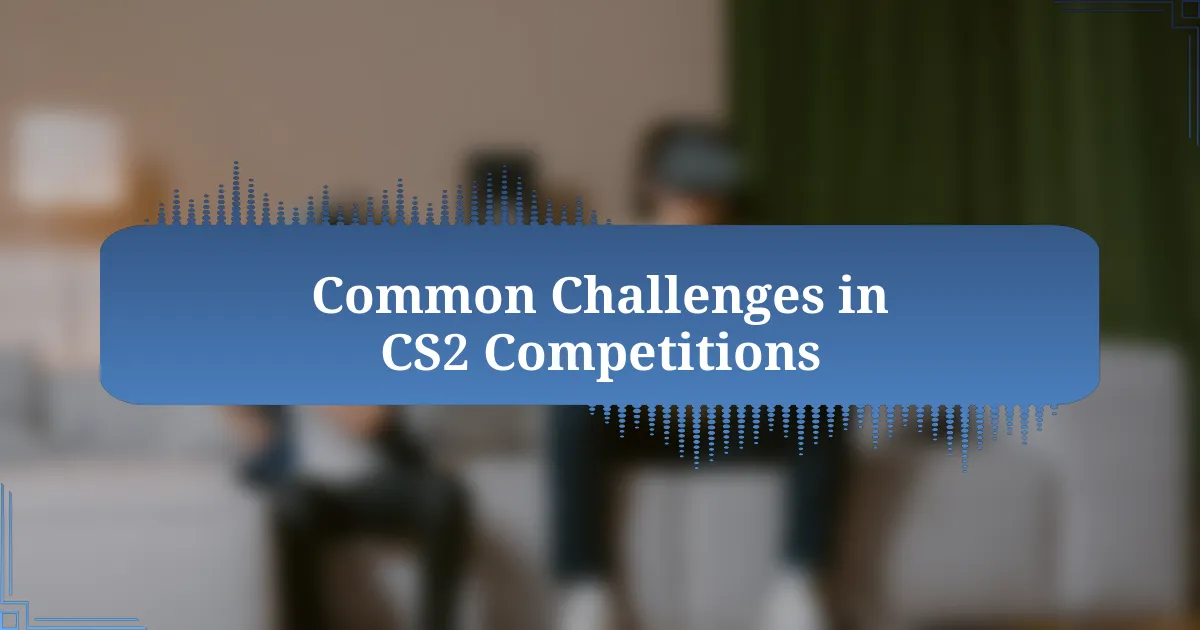
Common Challenges in CS2 Competitions
Common Challenges in CS2 Competitions
One of the most significant challenges I’ve faced in CS2 competitions is communication under pressure. During my first major tournament, I noticed how easy it was to misinterpret my teammates’ calls amidst the chaos of gunfire and explosions. Have you ever tried to strategize while everyone’s adrenaline is pumping? Establishing clear, concise communication beforehand can help cut through that chaos, but it takes practice to remain calm and collected when the stakes are high.
Another hurdle is dealing with the unpredictability of opponents. In one competition, I was blindsided by an unexpected strategy that turned our game upside down. I remember thinking, “How did we miss that?” Adapting on the fly is essential. It requires not just practice but also the ability to read the other team’s movements quickly. Reflecting on this, I realized that having a flexible mindset and rehearsing adaptability with my team can significantly impact our performance.
Finally, managing expectations can be tough, especially for newcomers. I vividly recall a moment when I placed too much pressure on myself to perform perfectly. The stress led to mistakes that affected not just my game but the team’s morale as well. Have you ever felt overwhelmed by the need to prove yourself? Balancing ambition with the enjoyment of the game is crucial; reminding myself that growth often comes from mistakes makes the journey more rewarding.
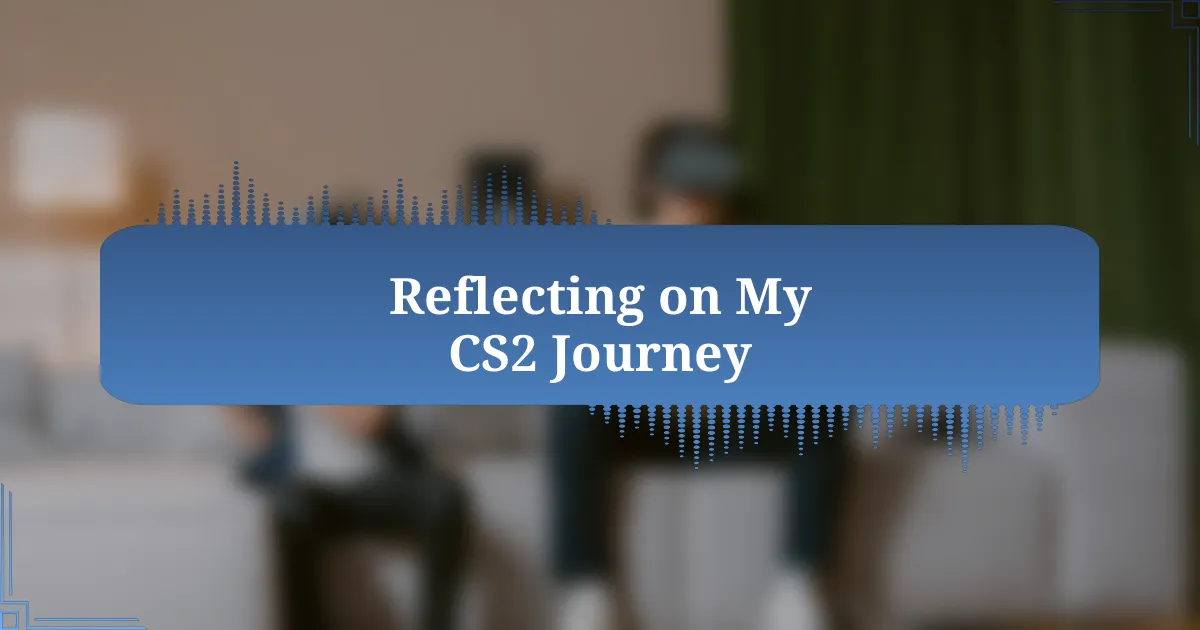
Reflecting on My CS2 Journey
Reflecting on my journey in CS2, I can pinpoint moments that took me by surprise, both good and bad. Early on, I was thrilled to compete, but I underestimated the time commitment needed for effective practice. Have you ever dived into something thinking you’d easily keep up, only to be overwhelmed by the learning curve? There were nights when I stayed up late, analyzing replays and strategies, realizing that true progress requires dedication and an understanding of one’s own limits.
One particular turning point for me was during a match where everything seemed to align perfectly—precise teamwork led us to victory. I felt a surge of adrenaline as we executed our strategy flawlessly. But looking back, I realize that while those moments were exhilarating, they also raised my expectations. I started to feel that I always needed to replicate that high-level performance. Have you ever felt the weight of your own expectations? It taught me the importance of enjoying the journey rather than focusing solely on the outcome.
As I reflect on the community surrounding CS2 competitions, I’ve come to appreciate the friendships formed through shared challenges. One late-night practice session, our team’s camaraderie deepened as we shared laughs after a particularly tough loss. It struck me then how important that support system is, especially when the pressure mounts. Do you ever find strength in your peers during tough times? Realizing that we’re all in this together made my experience richer and more meaningful, adding an emotional layer beyond just winning or losing.











